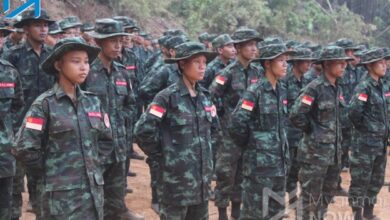
The European Union has warned Myanmar that it should not take its special trade privileges with the bloc for granted ahead of November’s election.
A week after Cambodia lost its tariff-free access to the market over concerns about human rights violations, an EU spokesperson said the situation in Myanmar was being watched closely.
The bloc has warned several times that Myanmar could lose its privileges under the Everything But Arms (EBA) scheme following military operations in 2017 against the Rohingya that led to accusations of genocide.
“While the EU continues to support Myanmar’s transition to democracy, Myanmar should not take EBA access for granted,” a spokesperson for the European Commission, the bloc’s executive branch, told Myanmar Now.
She added that the EU would work closely with Myanmar officials and expressed the importance of a transparent election process.
The Everything But Arms scheme grants poor countries access to EU markets without tariffs or quotas for everything except weapons.
Some observers say they fear November’s election may not be fully free and fair.
Last week the People’s Alliance for Credible Elections (PACE), a major election monitoring group, said it had been banned from observing the poll. The Union Election Commission (UEC) later denied the group had been banned.
The UEC has also been accused of discrimination after barring several Rohingya candidates from running for parliament this year. They include Kyaw Min, who won a seat in the 1990 election before the junta annulled the result.
Dr Maung Maung Lay, the vice-chair of UMFCCI, Myanmar’s chamber of commerce, said the EU was facing a dilemma over rights abuses in Myanmar and that it was important for the country to follow international norms.
Losing trade privileges would be a large blow for Myanmar’s exporters, he added.
“If we no longer have that, export products will become expensive and they won’t compete with products from other countries. That would affect the country’s revenue,” he said.
As part of their review of Myanmar’s access to the scheme, EU representatives met with local business owners at the UMFCCI in 2019, he added.
According to the commerce ministry, Myanmar exports fish, prawns, marine products, rice, a variety of beans, farmed products, clothing and accessories to the EU.
In 2019, the EU reimposed taxes on rice because, it said, cheaper imports from Myanmar and Cambodia had caused “economic damage” to European producers.
Myo Thu, director of the MyanTrade Organization under the commerce ministry, said the ministry had called upon the EU not to revoke trade privileges.
Garment manufacturers say they will be especially hard-hit by a withdrawal of privileges. The Covid-19 pandemic has already dealt a serious blow to clothing factories as orders dried up.
Withdrawing preferential access while the sector was struggling to recover from the pandemic would lead to serious hardship, said Tun Aung of the Myanmar Garment Manufacturers’ Association.
“With the GSP grant, it gives us some comfort,” he said, referring to the Generalized System of Preferences, the scheme that covers EBA. “Without it, it’s a bigger struggle and the market share would decrease.”
Myanmar’s garment exports skyrocketed after the country was added to the scheme in 2013. Garment revenues were worth $900m in 2012, but by 2017 were worth $2.7bn, according to data from the Investment Myanmar Summit 2019.
In the fiscal year 2019-2020, garment exports increased to about $4.58bn, according to the commerce ministry.


![Resistance fighters holding heavy weapons ammunition in central Myanmar. (Photo: Freedom Revolution Force [FRF])](https://myanmar-now.org/en/wp-content/uploads/sites/5/2024/04/438869056_443267851680128_1706386881626943924_n-390x220.jpeg)
